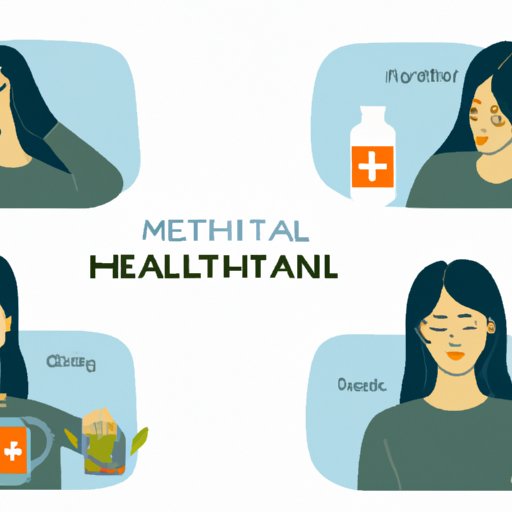
Introduction
Mental health is crucial to overall well-being. It affects how we think, feel, and make decisions, and influences our ability to cope with adversity. While mental health is often overlooked in favor of physical health, maintaining good mental health can lead to a fuller, more satisfying life. In this article, we will explore five simple habits to improve your mental health, the importance of self-care, the benefits of mindful breathing, how certain foods can affect mood, and the power of building a social support system.
“5 Simple Habits to Improve Your Mental Health Today”
1. Exercise regularly: Regular exercise has been shown to decrease symptoms of depression and anxiety while also boosting self-esteem. Aim for at least 30 minutes of moderate exercise per day, such as walking, swimming, or cycling.
2. Get enough sleep: Research consistently shows that sleep deprivation can increase the likelihood of developing mental health disorders. Aim for seven to nine hours of sleep per night to reduce the risk of developing anxiety and depression.
3. Incorporate mindfulness meditation: Mindfulness has been shown to be an effective way to reduce symptoms of anxiety and depression. Practice mindfulness by simply noticing your thoughts without judgment. Try meditation apps like Headspace or Calm.
4. Make time for hobbies: Taking time to engage in fulfilling activities can reduce stress and improve overall well-being. Whether it’s reading, painting, or gardening, dedicate time every day to engage in activities that bring joy.
5. Connect with nature: Simply spending time outside can improve mood, reduce stress, and boost happiness levels. Try going for a walk in a local park or taking a weekend trip to the countryside.
“Why Self-Care is Crucial for Good Mental Health (and How to Do It)”
Daily stress can take a toll on mental health. Self-care is an essential aspect of maintaining good mental health, which can include activities like taking a mental health day from work, treating oneself to a favorite activity, or simply setting aside time each day to relax. Here are a few steps to take towards committing to self-care:
1. Make a self-care plan: Set aside time every day to engage in activities that promote relaxation and reduce stress.
2. Set boundaries: Prioritize your needs by saying no to requests that will add to an already full plate.
3. Practice self-compassion: Treat yourself with the same kindness and respect you would offer to a loved one.
4. Use positive self-talk: Replace negative self-talk with positive affirmations.
“Mental Health and the Art of Mindful Breathing”
Breathing exercises can help to reduce stress and anxiety. Here’s how to practice mindful breathing:
1. Find a quiet space to sit comfortably with your eyes closed.
2. Focus on your breath as it moves in and out of your body.
3. If your mind wanders, simply return to focusing on your breath.
4. Practice daily until it becomes a habit.
Real-life examples of its effectiveness include combat soldiers, first responders, and individuals struggling with PTSD.
“Can Foods Affect Your Mental Health? Here’s What You Need to Know”
Our diet influences both physical and mental health. Here are a few examples of how certain foods can affect mood:
1. Omega-3 fatty acids: Fish, walnuts, and flaxseed are high in omega-3 fatty acids, which can improve brain function and reduce symptoms of depression and anxiety.
2. Probiotics: Fermented foods, such as yogurt and kimchi, contain probiotics which can reduce symptoms of depression and anxiety.
3. High glycemic index foods: Foods with a high glycemic index, such as white bread and sugary drinks, can increase the risk of developing depression.
4. Caffeine: While it’s often used to boost energy, caffeine can also increase anxiety and interfere with sleep.
To incorporate these foods into your diet, try incorporating fatty fish into your weekly meals or swap out a sugary snack for a probiotic-rich yogurt.
“How to Build a Support System for Better Mental Health”
Having a support system is essential for good mental health. Here are a few strategies for building or expanding your support network:
1. Join a group: Consider joining a group that shares a common interest or hobby. This can be a great way to meet new people and expand your social support network.
2. Reach out to loved ones: Make time to connect with loved ones, whether it’s a phone call, a text message, or a visit.
3. Seek professional help when needed: If you’re struggling with mental health, consider reaching out to a mental health professional for support. It’s okay to ask for help.
Conclusion
Good mental health is essential for overall well-being. Incorporating these tips and habits into your daily life can promote better mental health, reduce stress, and improve happiness. Remember to prioritize your mental health and reach out for professional help if needed.




